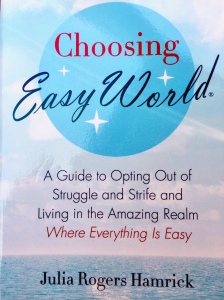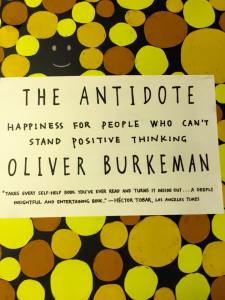
This book epitomizes everything I detest about the cult of positive thinking. Her solution for hardship? This mantra: “I choose to live in Easy World, where everything is easy.” It’s laughable, it’s ridiculous, and I’m throwing this book (lent to me) away.
By Lisa Alber
I grew up in a New Thought positive-thinking household. It was my childhood religion, and it warped me the way any religion can if taken too far. You know how you hear about recovering Catholics? Consider me a recovering positive thinker.
The basic tenet of positive thinking as espoused by the New Thought movement and every self-help guru you ever read is that you can achieve your heart’s desire through the power of the mind. Negative thinking is denounced and positive thinking becomes obligatory.
In theory, positive thinking is supposed to help us, but studies have shown that it often leads to worsened depression, lower self-esteem, decreased motivation, and increased anxiety.
I’ve been thinking about how all of this relates to my writing life. I can attest to the following:
1. Running after writing happiness — getting the best agent or the best book deal — made me miserable. The problem with going after happiness is that happiness as a goal in itself is a faulty proposition. What do we mean by it? And when we don’t achieve the goal that was supposed to make us happy? And keep not achieving the goal? After awhile, we might just self-sabotage ourselves by thinking, What’s the point of anything? Why am I putting myself through this? Why even bother?
2. The more I tried to stay positive about writing the more despondent I became. I AM a great writer, I AM successful, I AM I AM I AM. If the positive messages you’re bombarding yourself with conflict with reality or your belief you can enter into a state of “cognitive dissonance.” As the Wikipedia page says, “The brain strives for internal consistency.” As a result of the dissonance, you might find your writing self-esteem falling even further … more despondency … more depression … you get it.
3. I self-monitored myself into exhaustion. The thing about the cult of positive thinking is that it requires a lot of self-monitoring. We meta-think, which is to say we think about our thoughts. Wait, that was a negative thought; bad thought!; I gotta change that thought; my novel IS great and it WILL be published. There’s no way to keep that up all the time — and there comes a point when our brains might turn off altogether. Mental exhaustion does not promote creativity.
4. Believing that my publishing bad luck stories occurred because I wasn’t thinking positive enough also wore me out and increased my gloominess. Reality is reality, life isn’t necessarily fair, and no matter how hard we work, we might not get what we want. This isn’t our faults, but under the guise of positive thinking it’s hard to shake the notion that we are all-powerful. That’s a lot of frickin’ responsibility, my friends. No wonder I blamed myself for everything and sometimes crawled into bed for days at a time!
5. I believed something was wrong with me and compared myself to other writers to my own detriment. I suppose I’ll always struggle with this one. It’s hard not to compare ourselves against our peers and feel jealous at times. I now believe that positive thinking can worsen this tendency, thereby increasing our misery. Why? The cult of positive thinking would have us believe that with right thinking (and hard work, but some books you read don’t mention that part) we are equals. So, when we perceive an inequality, we may end up thinking, Hey, my book is better than so-and-so’s book, so why aren’t I published? Or, I work just as hard as so-and-so, so how come I’m not getting great reviews? Or, What am I doing wrong that I don’t have a book deal like so-and-so?
And we all know that the comparison game leads to suffering.
6. Sometimes I felt so disempowered that I’d give up for awhile. We humans tend to want to engage in activities we’re good at, so if we’re on a positive-thought downward cycle, thinking that we suck, why would we write at all?
7. Focussing on goal-setting and planning and future outcomes worsened my mood in general. Positive thinking tends to be future-oriented. But the secret to life, I’m finding, is mindfulness, which is about the present — the writing journey. Imagine my horror when I realized that I’d forgotten what the writing journey (which is a joy) felt like!
Note: I’m not saying the we shouldn’t set goals, just that pouring all our energy into visualizing and planning our perfect happy futures can increase our suffering in the present, and also de-motivate us to actually work toward our goals.
8. Mantras such as “I am where I’m meant to be” and “everything happens for a reason” and “if such-and-such doesn’t happen it means something better is around the corner” increased my anxiety. These mantras are supposed to provide solace, but I found myself clinging to them with ever more fearfulness. If they didn’t prove true, I’d be lost, I’d be unhappy, I’d have lived a life unfulfilled, I’d die with profound regrets. In other words, these mantras are BS, so get rid of them. They’re false prophets.
Do I have any answers for how to purge ourselves of the positive-thinking disease? Yes! Start by reading this book, which inspired this post. I’m only on Chapter 3, and I’m feeling lighter than I have in ages. I have much work to do, but I hereby proclaim my liberation from the tyranny of positive thinking!

One line of many that I highlighted: “… that it is our constant efforts to eliminate the negative — insecurity, uncertainty, failure, or sadness — that is what causes us to feel so insecure, anxious, uncertain, or unhappy.”
Has anything I’ve written above struck a cord with you? What’s your take on the cult of positive thinking?